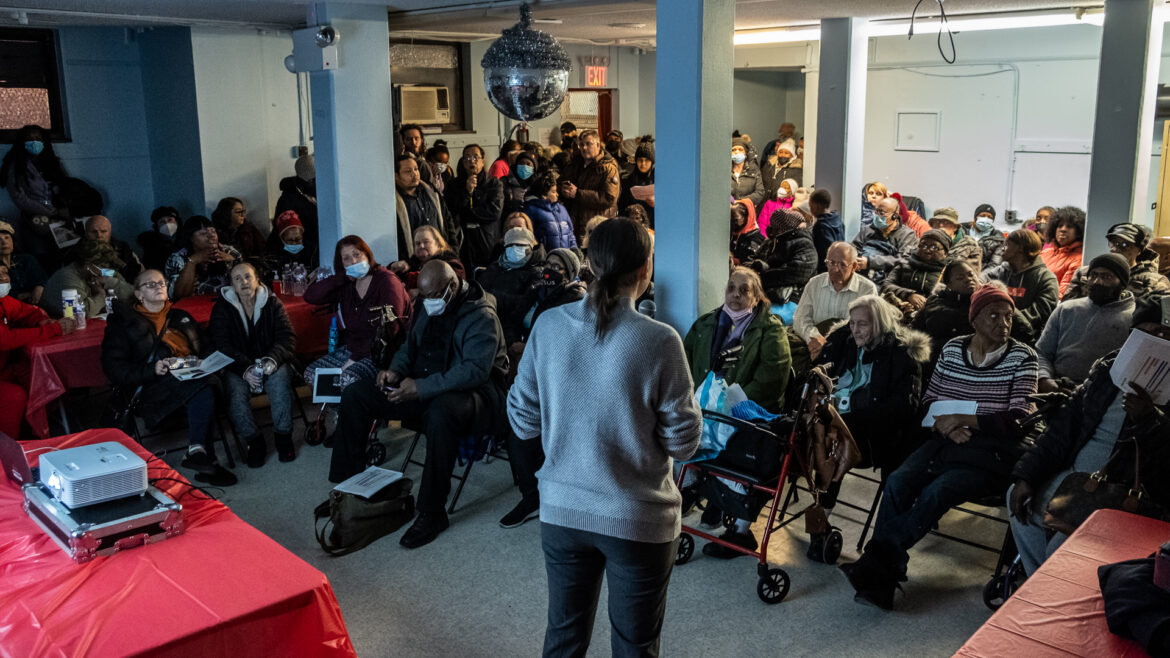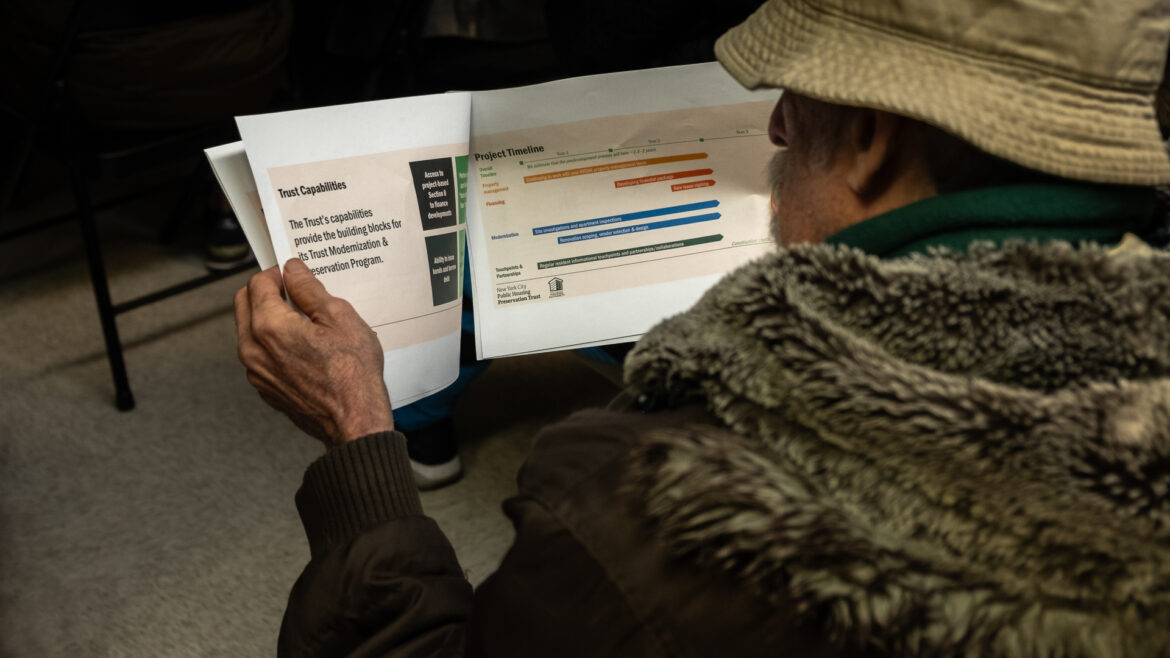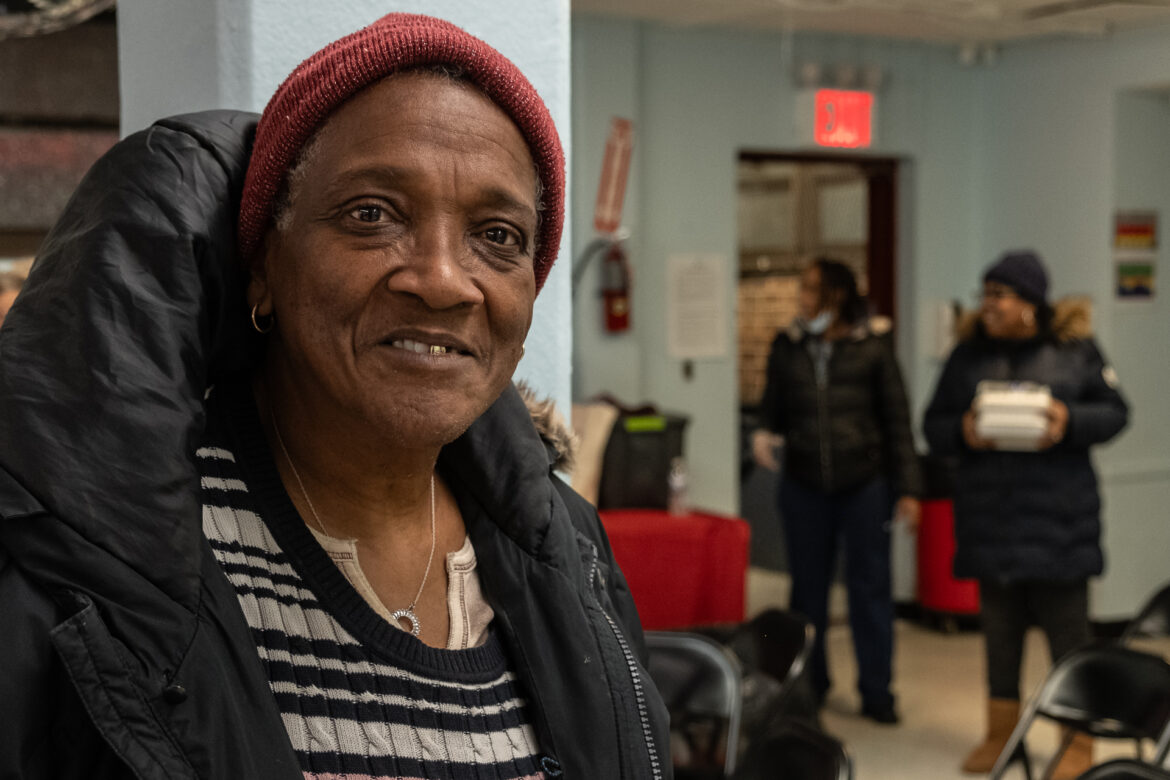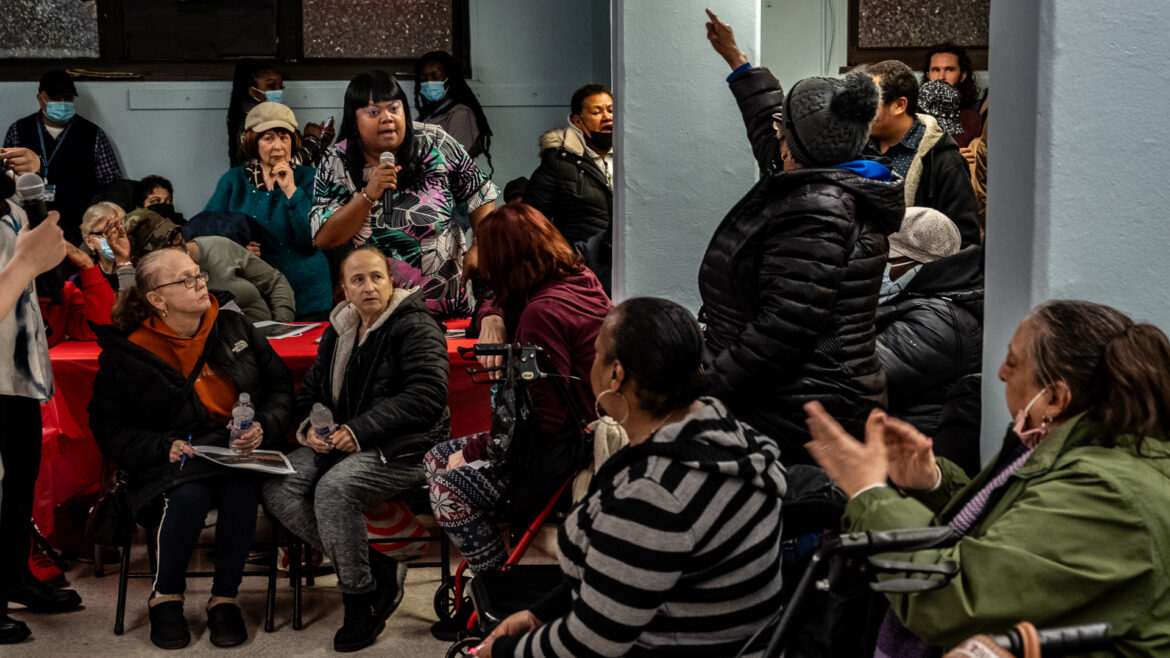Nostrand Houses residents packed into folding chairs in their community center Tuesday, eager to learn when repairs would begin now that they’ve joined the Public Housing Preservation Trust. Not right away, President Vlada Kenniff said.

Adi Talwar
NYCHA Preservation Trust President Vlada Kenniff addressing Nostrand Houses tenants at meeting on Jan. 23, 2024.On Tuesday night, for the first time since their campus became a testing ground for a novel funding model, residents of the Nostrand Houses in Sheepshead Bay were able to pose questions to the leadership of the Public Housing Preservation Trust.
Neighbors packed into folding chairs in their community center, eager to learn when repairs would begin. Not right away, Trust President Vlada Kenniff said.
Over the first year-and-a-half to two years, she explained, the New York City Housing Authority will work on transferring Nostrand Houses apartments out of Section 9 status, or traditional public housing.
Through this process, apartments will become eligible for federal Tenant Protection Vouchers (TPVs), which are worth double NYCHA’s current federal subsidy. The Trust can then leverage these more valuable subsidies to fund repairs.
Apartment inspections could begin in year two, Kenniff said. Construction may begin in the third year, and could require some tenants to temporarily relocate. As for the repair plan, Kenniff was careful not to commit to anything specific.
One tenant said she had heard stories from residents living in other NYCHA developments, who saw renovations take place in their kitchens and bathrooms. She wanted to know what Nostrand tenants could expect.
“I don’t want to promise anything yet and I want to be really careful about that,” Kenniff said. “The thing that I’m really focused on is plumbing and everything else we get will be incredible.”
Repairing the pipes is a “once in a lifetime opportunity,” she said, and could insure a functioning plumbing system for decades to come. But the crowd was silent for several seconds following her comments on the priority project.
Kenniff described other possible repairs, albeit hedging on feasibility. “New electrical systems would be really great, rehabbing the elevators would be great, but until it’s clear on how much funding we have, we don’t want to make any promises,” she said.
Tenants also had questions about the likelihood of having to move apartments—either for construction, or as a result of the initial transfer process out of traditional Section 9 public housing, which will include a careful review of each household in the complex.
Jillian McLaughlin, the Trust’s Chief Operating Officer, said her team is going to make sure tenants are living in appropriately-sized apartments, in accordance with NYCHA policy—one bedrooms for single people and larger apartments for families.
But like Kenniff, she emphasized the slow pace of change. “Nothing is happening today, next month, next year except beginning to understand your needs,” McLaughlin said.

Adi Talwar
A tenant leafs through materials from NYCHA about the Nostrand Houses’ conversion to the new Preservation Trust.The possibility of apartment shuffling was welcome to a tenant who gave her name as Monique. Addressing the crowd, she pointed out that some single people have large apartments.
“What happens to the people who are looking for a three bedroom apartment and there’s [a resident] who has a three bedroom apartment and it’s just them?” she said.
But another tenant balked at the possibility of having to downsize. “It’s a free country!” he shouted, shortly before exiting the meeting.
Other residents said they were fearful about the possibility of having to move during construction. Stella Glover, who has lived at Nostrand for 40 years, said that she supports the Trust, but is concerned about a possible relocation for seniors like herself.
“I’m a senior, I’m 70 years old and I don’t want to move,” Glover told City Limits. “A lot of us don’t want to move, especially if you’re used to your apartment for 40… 60 years, they don’t want anyone to take their apartment.”

Adi Talwar
Stella Glover, who has lived at Nostrand for 40 years.At various points in the meeting, McLaughlin emphasized that relocations would be “as short as possible,” and that NYCHA is working to hold units at Nostrand, and possibly the neighboring Sheepshead Bay Houses, to keep residents close during construction.
Any apartment “right-sizing” will be conducted in accordance with U.S. Department of Housing and Urban Development rules, she added.
“We will commit to people returning to the right apartment they left from and also, where we have to, work with people to abide by HUD rules on right-sizing,” McLaughlin said.
Last year, NYCHA announced a capital need of close to $80 billion over the next 20 years. At the Nostrand Houses, needed repairs are estimated to cost $600 million.
NYCHA selected Nostrand Houses as the first complex in the city to vote on whether to join the Trust. By law, at least 20 percent of heads of household had to participate in the election for the vote to be valid.
Tenants could also vote to remain in traditional public housing, or opt into Permanent Affordability Commitment Together, or PACT, through which NYCHA leases properties to private management companies in order to fund and facilitate renovations.
PACT has converted tens of thousands of units since its 2015 launch. Complexes like the Edenwald Houses in the Bronx have boasted kitchen renovations and manicured green spaces.
Ultimately, 51 percent of eligible Nostrand voters participated, according to NYCHA. The Trust drew 424 votes. Traditional public housing drew 172 votes, followed by PACT, with 163 votes.
Barbara McFadden, the tenant association president at Nostrand, is also a member of the Trust’s board. She was in a celebratory mood at the beginning of Tuesday’s meeting. “Not only were we first, we hit a home run,” she said. “I am so happy, let’s clap it up for Nostrand!”
At the end, Kenniff presented her with a proclamation, announcing that Mayor Eric Adams, a champion of the Trust initiative, had declared Jan. 23 Barbara McFadden Day.

Adi Talwar
Barbara McFadden, the tenant association president at Nostrand, speaking at Tuesday night’s meeting.But prior to the presentation, McFadden expressed some concerns about ensuring tenants get the repairs they’ve prioritized, drawing applause from the crowd.
“I want those wooden roach infested cabinets to go,” she said, pointing to other NYCHA campuses that have seen similar overhauls. “I’m not trying to compare Nostrand to other developments but I know what I saw when renovations took place.”
The Trust must deliver, she continued. “I want to see the new tubs come in, the new toilets, the new sink, the new tiles, the plumbing system done, I want a new boiler system done, and we’ve got those little elevators—they’re too small,” McFadden said. “If I don’t, I’m going to be in Washington D.C. with a bunch of residents.”
Courtney Yu, NYCHA’s state affairs officer, thanked McFadden for “keeping it real.”
“These are the things we want to hear but we don’t want to make false promises,” she continued. “We want to work together to make sure that we are coming up with a scope that best fits the development but also fits within the money that we’re able to raise.”
The Trust’s next meeting with Nostrand Houses residents will take place in April. Bronx River Addition Houses, in Soundview, will be the next campus to vote on adopting the Trust model, starting in mid-March.
To reach the reporter behind this story, contact Tatyana@citylimits.flywheelstaging.com. To reach the editor, contact Emma@citylimits.flywheelstaging.com.








